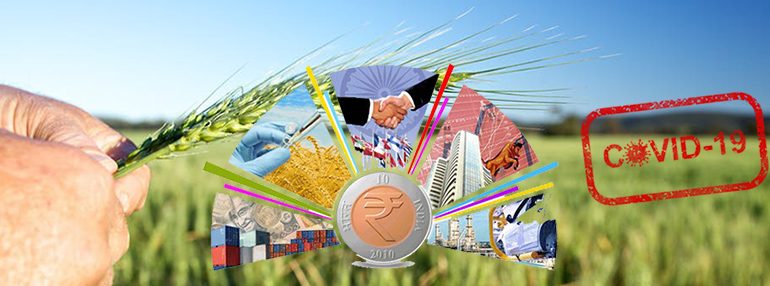The COVID-19 pandemic has caused disruptions in all spheres of life and has had significant impact on the agriculture sector and the economy. The Government of India has taken slew of measures to contain the spread and the damage caused by the pandemic. As a part of reviving economy, the government has announced ‘Atmanirbhar Bharat Abhiyan’,an economic relief package to bring back growth in the economy. The relief package had good share for the agricultural and allied sectors aimed at strengthening infrastructure, logistics and capacity building. The most important part of the package were the reforms and policy measures which were critical and bound to transform the sector.
One of the major reforms announced was amendment of The Essential Commodities Act (ECA), 1955. The Act in its previous form was inhibiting commercialisation of agriculture by imposing stock limits and movement restrictions. The government has deregulated cereals, pulses, edible oils, oil seeds, potato, and onion from this Act. Stock limits will not be imposed on food processors, value chain participants and exporters under the new framework. The ECA is usually invoked to curb unwarranted price spikes of the commodities listed under the Act as high food inflation hurts consumers. For a long time it has been the contention of farmers that India’s farm and food policies have an urban bias. On the other hand, the amendment will be instrumental in attracting more investments in building or upgrading the storage infrastructure (warehouses/silos/cold storages). Besides, these amendments will also have a significant impact in aligning cropping patterns with respect to market dynamics.
Effective marketing of agriculture produce is necessary to maximise the economic potential. The Government has announced that it will come up with a central law to provide farmers choice to sell at attractive prices and interstate trade to be made barrier free. Agriculture is a state subject and agricultural marketing is governed by APMC Acts of respective states. As per the APMC Act, a trader/commission agent/processor needs to have a license for sale and purchase of the commodity. It is difficult for the buyer/processors/traders to have license in each and every state and hence they route the trade through an existing license holder of the state. By doing so, will add to the cost and in turn will have a bearing on the farmer realizations. A unified license across the country is the need of the hour which means any buyer registered in any part of the country can buy any commodity from any other part of the country. Apart from this, APMC cess, a major revenue earner for state governments will also be hampered because of this as some states might have to lose the tax collections. Hence, implementation issues may emanate from few state governments. Further, supply chains will become more efficient on account of reduced handlings. The biggest beneficiary of this reform will be food processing industry related to perishables and organised retail sector. The intention of the government in coming out with these reforms seems to increase the producers’ share in consumer pie in the longer term perspective and indirectly hint at gradual reduction in dependency on the current mandi system. The government has also announced that e-trade of the produce will be facilitated. Does this mean e-Nam, which is currently in place, will be extended to all mandis of the country or a new e- market place will be rolled out by the government? Clarity on this part will clear the air in the minds of the value chain participants.
The government has also announced that a standard mechanism for predictable pricing will be put in place and under this the government will come up with a legal framework to help farmers to fix their own price for the commodity they produce, assures guaranteed return for the crops before sowing and further proposes to increase availability of farm technology and selling opportunities. Prices of commodities depend on supply and demand dynamics, apart from government policies on trade from time to time. Through this policy, it looks like the government is planning to come up with clear guidelines on contract farming in the near future. A further look at these proposed reforms also hints that the government is planning to do away with the current MSP regime in gradual manner over the next few years.
Due to pandemic, the pressure on agriculture as a source of livelihood has increased as migrant labours are returning to their villages. A one lakh crore fund for strengthening the farm gate infrastructure and the additional MNREGA fund announced to provide employment to homecoming labourers will benefit agriculture sector. Overall the reforms will be constructive in increasing the primary sector’s contribution in the country’s GDP.
The author is Co-Chairman, FICCI National Agriculture Committee and Managing Director and CEO, NCML





